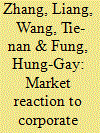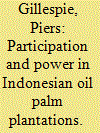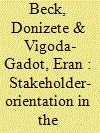| Srl | Item |
| 1 |
ID:
130983


|
|
|
|
|
| Publication |
2014.
|
| Summary/Abstract |
Many studies have been performed to assess the impacts of corporate social responsibility (CSR) on the financial performance of companies. There are, however, very few studies that analyze how CSR policies and instruments affect the realization of social and environmental CSR goals, such as the reduction of workplace accidents or CO2 emissions. Therefore, it remains uncertain to what extent CSR really contributes to sustainable development and whether it can serve as an alternative to government regulation to internalize external effects from market operation. The present study provides an explorative empirical analysis that aims to fill this gap. We employ regression analysis on a sample of 109 Chinese companies. The estimation results show that having a code of conduct stimulates the implementation of other organizational CSR instruments, but CSR implementation only partly affects the realization of CSR goals. Having codes of conduct without implementing CSR does not have a significant impact on societal welfare.
|
|
|
|
|
|
|
|
|
|
|
|
|
|
|
|
| 2 |
ID:
130982


|
|
|
|
|
| Publication |
2014.
|
| Summary/Abstract |
This study uses an event study methodology to examine how the Chinese market reacts to announcements of involvement in corporate social responsibility (CSR) by Southern Weekend (a Chinese newspaper) for Chinese firms from 2008 to 2012. Our results show significant and positive market reactions, supporting the instrumental stakeholder theory. We attribute the positive market response to social capital development and real growth options related to the CSR involvement by the Chinese firms.
|
|
|
|
|
|
|
|
|
|
|
|
|
|
|
|
| 3 |
ID:
117139


|
|
|
|
|
| Publication |
2012.
|
| Summary/Abstract |
Participation is commonly accepted to be a process that brings stakeholders together to define issues and create mutually beneficial outcomes. In the fields of development and natural resource management, participation is such a widely accepted part of policy that it is rare to find a project or programme that does not exhort the practice of participation and stakeholder engagement. However, despite the considerable weight of orthodoxy advocating greater participation and stakeholder engagement in development, the participative processes and power relations underpinning such engagement are rarely analysed in careful detail. This is particularly the case with oil palm plantations in frontier Indonesia and the interactions between the principal stakeholders at the plantation-community level. There has been minimal analysis to date appraising how such stakeholders interact in relation to a plantation, and there is limited description outlining the divergent viewpoints from such stakeholders. The paper argues that one local stakeholder group, oil palm smallholders, usually possess some agency in their decision-making and interactions with a plantation organisation but that existing structural and informal modes of interaction often limit the transformative potential of participation for all stakeholders.
|
|
|
|
|
|
|
|
|
|
|
|
|
|
|
|
| 4 |
ID:
192905


|
|
|
|
|
| Summary/Abstract |
Stakeholder-orientation is useful for managing conflicts between stakeholders and strategizing urban sustainability. This qualitative meta-analysis explores the characteristics and challenges of stakeholder-orientation in the governance of Israeli cities and local communities. Main findings: (1) migrants and immigrants, third sector and civil society movements, and religious groups are more protagonists in the Israeli urban governance in comparison to general urban contexts; (2) Though influenced by communicative planning, more effort should be made to strengthen stakeholder-orientation as a sustainable urban strategy; and (3) The power of networks has its attention increased in Israeli urban governance as in other contexts worldwide.
|
|
|
|
|
|
|
|
|
|
|
|
|
|
|
|